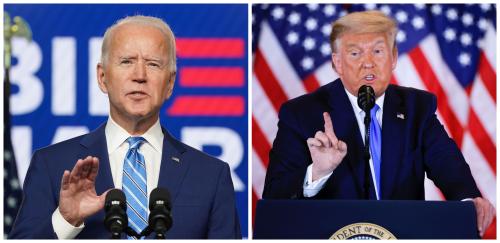The most consequential choices new presidents make are what issues to prioritize and what people will comprise their team. The first 100 days contain the same number of hours for all presidents, regardless of how troubled the situation they inherit. President elect-Biden’s arrives in the midst of a multitude of crises – economic, social, and physical – each of which cries out for a lengthy list of new policies. The new administration’s priorities for financial regulation need to be considered within this competition for presidential and Congressional time and attention. Depending on the outcome of Georgia’s runoff races, President-elect Biden may arrive in office with a Senate held by the opposing party – the first newly-elected president to see that scenario in over forty years. For financial regulation, he will need to prioritize a regulatory agenda over a legislative one. Here are the five top financial regulation actions that President-elect Biden and his team should prioritize.
1) Covid-19 is the top priority for FinReg.
President-elect Biden inherits an economy infected by the COVID virus, which in turn threatens people and businesses, damaging financial institutions and markets. This is structurally different than the situation President-elect Obama inherited when the disease infecting the economy was based in financial markets and institutions. Thus, while the Obama administration had to prioritize restoring the financial system, and hence financial regulation, the Biden administration must focus on the root cause of the problem: getting COVID under control. Financial regulatory advocates should embrace this and avoid prioritizing the financial symptoms over the actual disease.
2) Restore the Consumer Financial Protection Bureau (CFPB).
The CFPB was established to be the voice for consumers to ensure the financial system never again manipulated people for unscrupulous profit. The Trump Administration tried its best to systematically neuter the agency. It politicized the independent agency by placing the president’s Chief of Staff who had once called the CFPB a ‘sick joke’ in charge. Whereas the Bureau collected $12 billion in fines for consumer abuses during the inaugural Director Richard Cordray’s tenure, in the second quarter of this year, CFPB collected only $8. That’s right, not $8 million or $8 billion, but simply $8 of fines. America needs a cop back on the beat to police financial malfeasance.
The first step to restore the CFPB is to promptly name a new Director. While the Dodd-Frank Act envisioned the CFPB Director as immune from political replacement due to the change of Administration, a recent Supreme Court decision removed that protection (wrongly in this author’s opinion). However, the result is that Biden can now name a new CFPB Director on day one, placing the agency in temporary new leadership while the Senate waits to confirm a formal nominee. While CFPB has become intensely polarized its inaugural Director, Richard Cordray was appointed with a strong bipartisan majority (66-34). Finding a new Director who shares Cordray’s strong pro-consumer vision and can find bipartisan support is critical.
The acting and then new director should set about aggressively reviving the Bureau though new supervision and enforcement actions as well as revisiting important consumer regulations such as requiring Payday lenders to underwrite loans only to consumers who have an ability to repay them. This is particularly important during the COVID recession, as millions of people who are suffering deep economic harm in this recession are susceptible to financial scams.
3) Embrace FinTech’s potential while protecting against bias.
Technology is changing everything, and finance is no exception. The original iPhone was introduced in summer 2007, right as the financial crisis was beginning. The rise of new financial technology (fintech) heralds fantastic opportunities to address structural flaws that have plagued millions of people, particularly people of color, who have faced systemic racial discrimination in mortgages, auto lending, and many other basic financial services. At the same time, fintech has the opportunity to reinforce these existing biases, further distributing opportunity among those with money and solidifying a high-cost alternate financial ecosystem for those without money. The existing financial system is a reason why it is expensive to be poor. It also offers tremendous rewards to those who qualify for elite status, the rich.
America’s legal and regulatory system governing the tension between technology and anti-discrimination relies on laws passed often in the 1970s and regulations that assume a radically different set of technologies. New financial regulators have the opportunity to adapt these regulations and laws to better harness the good fintech can provide and avoid the harm. One prominent example is using a person’s cash flow to underwrite for a loan as opposed to their credit score (aka FICO score). FICO is the out of tune oboe the rest of the financial orchestra, including regulators, have tuned to. Regulators need to revise their existing rules that explicitly or de facto require adherence to analysis on these FICO scores, similar to how an overreliance on credit rating agencies letter grades contributed to the financial crisis. Another example is to set new regulations for consumers financial data access under the CFPB’s so-called Section 1033 authority. Establishing the right set of rules will enable new technologies to flourish, providing benefits to millions.
New regulators need to focus on new tools to use fintech for good. They should not fear embracing change as the status quo is failing far too many. A corollary to focusing on the future is to not continue unnecessary past conflicts. New regulators should resist the temptation to go back to what was on their desks four, eight, or twenty years ago. Instead, focus on new potential solutions to problems.
4) Transformative change is needed, but incremental change is still desirable.
Our financial system has become a reverse Robin Hood, taking money from those with less and giving to those who already have. ‘Free checking’ accounts are plentiful for those who always have a thousand dollars or more in their bank account, while those living paycheck to paycheck spend billions in overdraft fees. The richer you are the less you pay for anything you buy. Those credit card rewards available only to the wealthy who qualify are subsidized by lower income people paying with debit, pre-paid or cash (and yes merchants shoulder some of the costs too). A minority of Americans enjoy prime credit status with plentiful cheap and rewarding credit, while 15 to 20 percent of customers with bank accounts still go to check cashers, payday lenders, and wire transmitters to fulfill basic services the rich often receive for free.
New financial regulators should recognize the scale of the problem and consider transformative change. But transformative change takes time, and the financial system operates every second in between. Regulators must fix problems as quickly as they can, improving the very system they are seeking to replace. For example, the most impactful change financial regulators could make on day one of the Biden Administration is to give people access to their money immediately. The Federal Reserve could use its authority under the Expedited Funds Availability Act (EFA) section 4002(d) to allow people to have faster access to their own money, reducing demand for expensive payday loans and overdrafts. The Fed has resisted doing this, instead promising a new payment system sometime in the mid-2020s. American families can’t afford to wait another four or more years for a change that could save them tens of billions a year right now. If the financial regulators refuse to act, Congress could change the law, as legislation introduced by Senators Van Hollen and Warren and Reps. Pressley and Garcia propose. This bill doesn’t require any government spending and could be passed quickly or attached to other legislation easily.
All banks should be required to offer low-cost, no overdraft, safe bank accounts. The banking industry’s largest trade association, the American Bankers Association has urged all banks to offer these non-controversial accounts. Regulators should step up the pressure include requiring these be offered. President-elect Biden should prioritize simple steps like this, that produce tangible immediate results to improve the financial system for working people. This is not in lieu of transformative change but is a way to fix the system while working to change it.
5) Appoint quality people.
The recent financial crisis of 2008 not only shaped the economy of the 2010s but also impacted much of our politics. Any new Administration faces a natural inclination to relitigate the past and it is strong here given political debate regarding implementation of the landmark Dodd-Frank Act of 2010. The reality is that while candidate Donald Trump campaigned on “doing a big number” to Dodd-Frank, his administration’s changes were far more modest (excepting the CFPB as discussed above). The major legislative accomplishment was more a codification of the basic structure of Dodd-Frank with some (problematic) alterations than a full-frontal assault. The Dodd-Frank regime fundamentally relies on the financial regulator’s judgment and will to act than on specific sections of law. Congress cannot legislate judgment.
President-elect Biden should prioritize appointing strong financial regulators with sound judgment and strong will to act. There has been a troubling trend over prior administrations to wait too long to nominate financial regulators. As the Bipartisan Policy Center’s research found, growth in delays in regulators has been more of a function of delays in nomination than in consideration by the Senate. President-elect Biden can reverse this by quickly nominating a new comptroller of the currency, filling existing vacancies in the Federal Reserve Board, FDIC Board, SEC, and devising an aggressive game plan to fill future vacancies. Nominate and hopefully confirm quality candidates quickly. This may require greater consultation with the Republican controlled Senate than the Biden Administration had wished, but plenty of quality potential regulators with bipartisan appeal exist. Find them and move them through the process. Then let them and their agencies do the hard work, while the White House turns its attention to other matters.
During this transition and President-elect Biden’s first hundred days, financial regulation will likely take a back seat to more pressing issues like fighting COVID and directly helping those impacted by this recession. That’s OK. In fact, addressing the core problems posed by the virus is the most pressing problem facing our financial system. These other priorities should enable the new administration to lay the groundwork for immediate progress as well as the necessary longer-term structural reform.
The author would like to thank Bella Dunbar for her editorial and research assistance on this piece.
The Brookings Institution is committed to quality, independence, and impact.
We are supported by a diverse array of funders. In line with our values and policies, each Brookings publication represents the sole views of its author(s).








Commentary
Op-edTop 5 financial regulatory priorities for the Biden administration
November 9, 2020